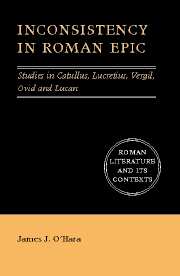Book contents
- Frontmatter
- Contents
- Acknowledgments
- Introduction
- 1 Greek versions
- 2 Catullus 64: Variants and the virtues of heroes
- 3 Death, inconsistency, and the Epicurean poet
- 4 Voices, variants, and inconsistency in the Aeneid
- 5 Inconsistency and authority in Ovid's Metamorphoses
- 6 Postscript: Lucan's Bellum Civile and the inconsistent Roman epic
- Bibliography
- Index of passages discussed
- General index
Introduction
Published online by Cambridge University Press: 12 January 2010
- Frontmatter
- Contents
- Acknowledgments
- Introduction
- 1 Greek versions
- 2 Catullus 64: Variants and the virtues of heroes
- 3 Death, inconsistency, and the Epicurean poet
- 4 Voices, variants, and inconsistency in the Aeneid
- 5 Inconsistency and authority in Ovid's Metamorphoses
- 6 Postscript: Lucan's Bellum Civile and the inconsistent Roman epic
- Bibliography
- Index of passages discussed
- General index
Summary
This short book about long poems explores the possibility of interpreting, rather than removing or explaining away, inconsistencies in ancient texts. My main argument is that comparative study of the literary use of inconsistencies can shed light on major problems in epics written by five Roman authors: Catullus, Lucretius, Vergil, Ovid, and Lucan – though Lucan gets only a short concluding chapter. I hope that the book offers a valuable vantage point from which to consider major recent trends in the study of Greek and especially Latin poetry, and that those who read it will find that it helps them become better readers of the poems treated, and perhaps other works as well.
This book flows from earlier work I have done on Vergil, with my perspective broadened to include the four other Roman poets, a number of Greek authors, and I hope a greater range of interpretive reflection. Too much work in Classics focuses on individual authors, without seeing them in the context of what other more or less similar authors are doing. I believe this is strikingly true for the phenomenon at the heart of this study. I attempt to trace and analyze, in several authors, something a number of scholars have been noticing in isolation in individual authors, often without mentioning work being done by anyone else.
- Type
- Chapter
- Information
- Inconsistency in Roman EpicStudies in Catullus, Lucretius, Vergil, Ovid and Lucan, pp. 1 - 7Publisher: Cambridge University PressPrint publication year: 2007
- 1
- Cited by

